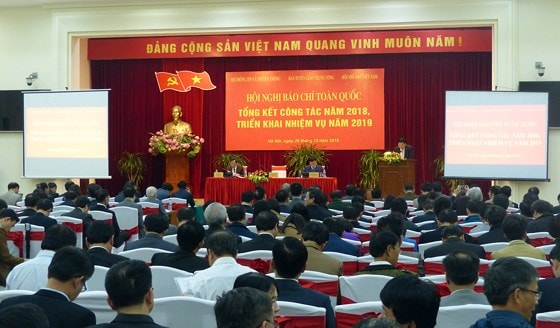Prevent the deviation from the principles and purposes and the "newspaperization" of electronic magazines
In 2018, violations in press activities continued to be dealt with decisively by many measures; inspection, review, and evaluation of the implementation of the principles and purposes of a number of press agencies, especially electronic magazines, were strengthened, in order to prevent deviation from the principles and purposes, and "newspaperization" of electronic magazines.
 |
| Conference scene. Photo: TB |
On the afternoon of December 28, in Hanoi, the Central Propaganda Department coordinated with the Ministry of Information and Communications and the Vietnam Journalists Association to organize a national press conference to summarize the work of 2018 and deploy tasks for 2019.
Comrade Vo Van Thuong, Politburo member, Secretary of the Party Central Committee, Head of the Central Propaganda Department attended and chaired the conference with nearly 600 delegates who are leaders of national press agencies and ministries and branches.
The report on the assessment of press work in 2018 and some key tasks in 2019 presented by comrade Le Manh Hung, Deputy Head of the Central Propaganda Department at the conference, said that as of November 2018, the whole country had about 19,000 journalists granted Journalist Cards; the number of Journalist Association members was 23,893. The whole country currently has 844 print press agencies with 184 print newspapers, 660 magazines and 24 independent electronic press agencies.
There are currently 189 licenses to establish general electronic information sites granted to print, radio and television press agencies. The country has 67 radio and television stations; at present, there are 35 enterprises providing paid radio and television services...
In 2018, total revenue generated in the press sector reached over 15,840 billion VND. Of which, total revenue of print and electronic newspapers was estimated at about 4,900 billion VND; revenue of radio and television stations reached about 10,940 billion VND, of which advertising revenue was about 9,631 billion VND. In 2018, the number of printed newspapers' circulation and advertising continued to decrease, significantly affecting the revenue of these press agencies.
 |
| The country currently has 844 print press agencies with 184 print newspapers, 660 magazines and 24 independent electronic press agencies. Illustrative photo |
In addition to the achievements in 2018, press activities still have shortcomings and limitations such as: Information lacking political sensitivity, not suitable for the interests of the country and the people, and incorrect information orientation still occurs in some newspapers and magazines, causing negative impacts on public opinion, affecting the legitimate interests of organizations and people; being exploited by some foreign newspapers and some ill-intentioned social networking sites to distort, incite, and negatively affect political security and social order and safety. Information that tends to exploit the negative side of society; offensive information, information that goes against Vietnamese customs and traditions, lacks humanity and anti-education, sensational headlines, "clickbait"... have not been completely overcome. Information has not kept up with the developments of the actual situation; the fight against refuting incorrect information and viewpoints, in many cases, is still passive and not sharp; The exploitation of information from personal opinions on social networks without verification continues.
In addition, there are still some representative offices, resident reporters of local press agencies and teams of collaborators who do not operate in accordance with their functions and duties; violations of journalistic ethics still occur. The tendency to deviate from the principles and purposes has not been overcome. The situation of complaints about the content of information in the press tends to increase.
The biggest challenge facing journalism today is the risk of being "overtaken" by social media, losing its monopoly position, surpassing the speed in providing information to readers, and using members' accounts to post information and articles that violate regulations on providing information online.
Information on social networks is personal, the scope of information is scattered, fragmented, unverified, with unclear motives and purposes, even with the purpose of distorting, deceiving, spreading fake news to attract attention. Press agencies that do not verify information will be led and enticed by false information, which can have a negative impact on public opinion and affect the reputation of the newspaper.
Recently, many press agencies have been implementing strategies to exploit social networks to attract and increase the number of visitors, promote the image, brand and quality of information to the online community. However, when large social networks use the feature to limit the sharing of press links on their platforms, the press is at risk of losing readers and reducing the ability to interact.
According to the Central Propaganda Department, the Ministry of Information and Communications and the Vietnam Journalists Association, the objective causes of the limitations and shortcomings include: The organization, management and provision of information by many agencies, organizations and localities are still not proactive, not timely, and lack coordination, especially with important and complicated situations and events related to politics, economics, society and foreign affairs, causing difficulties for information management and direction agencies as well as press agencies. Some governing agencies are not resolute in handling violations by press agencies under their responsibility. Some issues that cause social outrage are slow to be resolved by authorities, lack coordination or do not have a satisfactory method of handling information, creating "hot" issues in the press, even causing a media "crisis".
Hostile, reactionary, and opportunistic political forces continue to plot and promote activities against the Vietnamese State in many forms, including taking advantage of social networks to organize the transmission of bad and toxic information. Equipment and technology of many press agencies, especially local ones, are still lacking; press agencies are still lax in managing advertising contracts, using advertising software from cross-border advertising companies, thus failing to control advertising content, allowing many advertising information to violate the provisions of the law.
Subjective causes leading to limitations and shortcomings include: Some press agencies are not strict in their awareness of information discipline. Some press agencies have not implemented or lack responsibility in assessing and verifying information sources, and have not followed the correct journalism process. The budget allocated for regular activities has not increased proportionately; many press agencies, especially newspapers and magazines of associations, are not allocated operating funds, do not pay salaries to reporters, and are contracted to collect and contract advertising. The awareness of press economics of press agencies is currently limited to finding revenue from advertising and media contracts, without considering fundamental solutions. Some press agencies manage representative offices, use and recruit resident reporters and collaborators in a lax and lax manner, causing difficulties in local management.
In 2018, violations in press activities continued to be dealt with decisively by many measures; inspection, review, and evaluation of the implementation of the principles and purposes of a number of press agencies, especially electronic magazines, were strengthened, in order to prevent deviation from the principles and purposes, and "newspaperization" of electronic magazines.
Many violating newspapers and magazines have been temporarily suspended, and some violating journalists have had their press cards revoked. The strict handling of violations has contributed to maintaining order and discipline in press activities, improving the effectiveness and efficiency of state management.
In 2018, the Inspectorate of the Ministry of Information and Communications and relevant agencies conducted planned inspections of compliance with press regulations at 11 press agencies, and handled administrative violations at 46 press agencies with a total fine of VND 638,100,000. At the same time, in 2018, the Ministry of Information and Communications issued decisions to revoke the Press Cards of 4 journalists due to violations and disciplinary action.

.jpg)
.png)





